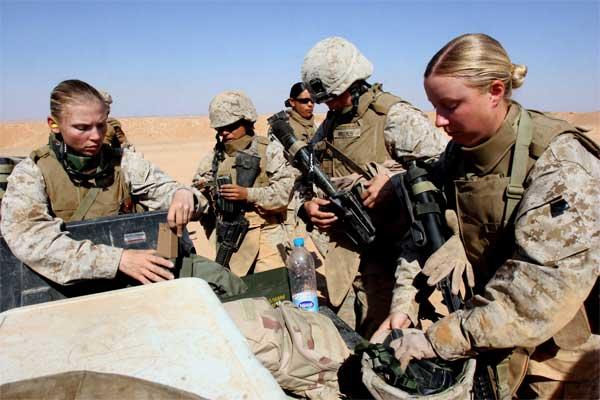A Marine staff sergeant will be the first woman to participate in MARSOC assessment and selection in August, just months after the Pentagon opened the door to women serving as operators.
The unidentified West Coast-based staff sergeant had approached MARSOC recruiters earlier, but was turned away because she lacked the general technical score prerequisite for critical skills operators, MARSOC Commanding General Maj. Gen. Joseph Osterman told Military.com. But after the Marine improved her score, her application package to the selection was accepted, Osterman said.
MARSOC is the first element within U.S. Special Operations Command to publicly confirm a female applicant after special operations jobs were opened to women earlier this year. This recruiting success may be due in part to an aggressive recruiting strategy. Osterman previously told Military.com that MARSOC recruiters had notified every eligible female Marine of the opportunity to apply to become a Raider early in the year.
The small command, with a force of roughly 2,700, is also ahead of the larger Marine Corps in this regard. While infantry jobs are now available to female Marines, officials said last week that none have yet applied to join the previously closed community.
For MARSOC, Marines must complete a two-phase assessment and selection screening process that spans about six weeks and includes punishing physical training and classroom instruction that covers land navigation skills, MARSOC and special operations history, and nutrition and fitness principles. Those who make it through screening must complete a nine-month, four-phase individual training course to become a critical skills operator.
A female officer has also expressed interest in MARSOC, Osterman said, but has yet to submit her application package.
"We're seeing good progress that way," he said. "We're going to try to leverage some of the work that was done by the [Marine Corps] integrated task force as well as the [Army's] Ranger School and what they've done, just to make sure we've got it all well prepared and all set up so that it will go smoothly and everything progresses well in terms of just normal standards for A&S."
The Marines' Ground Combat Integrated Task Force studied the effects of introducing female troops to ground combat units in a year-long experiment that wrapped up last summer. The Army opened its Ranger School to women in 2015, graduating three female officers. Osterman said MARSOC officials were just beginning to communicate with the planners behind both efforts, and it wasn't decided which aspects the Marines' special operations command would borrow from each.
But feedback from female Ranger school participants is already helping MARSOC officials to craft a strategy that will shield female applicants from undue public attention during training.
"One of the things that we did learn early on from Ranger School was that it was actually detrimental to female applicants when they have too much notoriety associated with their accession to the pipeline," Osterman said.
"What really works best to maintain standards and to give them the fairest opportunity in the process is to have them, they're just another Marine in the process, having to go on that way," he said. "So right now we're actually formulating a communications plan that we can work with media in order to make sure that we keep everyone aware but at the same time respect [their privacy]."
Ahead of the first integrated class in August, Osterman said, MARSOC is meeting requirements set in the Marine Corps' implementation plan to open all previously closed jobs to women. The plan required that a cadre of at least two female noncommissioned officers or officers would be assigned as staff to A&S before the arrival of a female applicant.
That effort is well underway, Osterman said.
"We went through identified everybody within MARSOC who would be able to do that and set prerequisites that the instructor staff is required to maintain," he said. "And we went through a selection process and interview process, and then walked them into essentially the instructor cadre."
-- Hope Hodge Seck can be reached hope.seck@military.com. Follow her on Twitter at @HopeSeck.
Don't Miss a Single Military.com Story
To read the full article and get exclusive benefits, sign up today.
It’s FREE
Why am I seeing this? Visit our FAQs



























